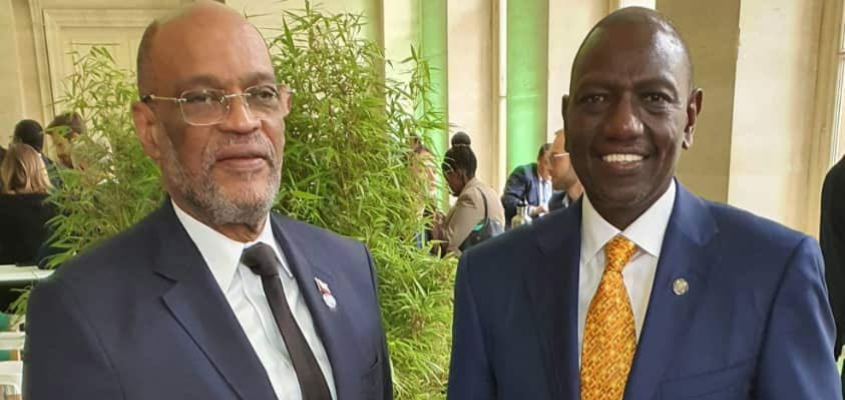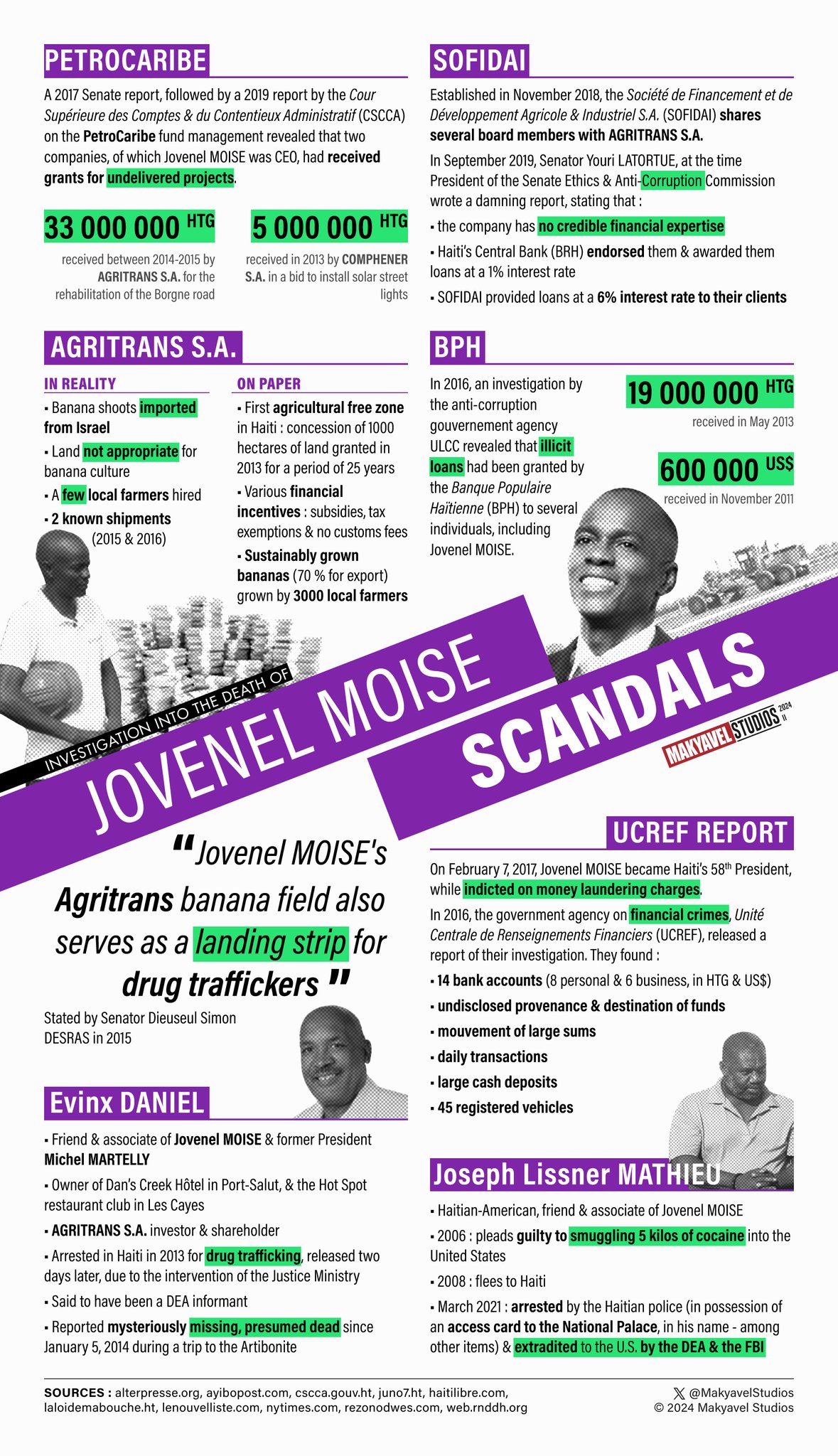You are using an out of date browser. It may not display this or other websites correctly.
You should upgrade or use an alternative browser.
You should upgrade or use an alternative browser.
Haiti: Nearly a Million People Took to the Streets.They Want the Western-imposed government out of
- Thread starter loyola llothta
- Start date
More options
Who Replied?loyola llothta
☭☭☭
loyola llothta
☭☭☭
loyola llothta
☭☭☭
loyola llothta
☭☭☭
Kenya Ignores Court Order to Join Occupation of Haiti
Rezo Nodwes
07 Feb 2024

Kenya’s police deployment to Haiti and the spurious claim of "reciprocity", knowingly and willfully promoted by Ariel Henry, William Ruto, and others, is in flagrant violation of the National Police Service Act.
Originally Published in Rezo Nòdwès
Kenya is one of the world’s most corrupted countries. In 2017, Kenya ranked 143 out of 180 countries on Transparency International’s (TI) corruption index. High corruption levels permeating every sector of Kenya’s economy and politics is hindering development and endangering democracy.
The New England Human Rights Organization (NEHRO) reaffirms its commitment to promoting human rights wherever violations might occur. Therefore, the organization adopts a holistic approach to human rights, encompassing the right to life and liberty; freedom from slavery and torture; freedom of opinion and expression; as well as the right to work and education, to name a few. According to the United Nations, « everyone is entitled to these rights, without discrimination. »
On January 26, 2024, Kenya’s High Court Judge Enock Chacha Mwita ruled that « any decision by any state organ or state officer to deploy police officers to Haiti… contravenes the constitution and the law and is therefore unconstitutional, illegal, and invalid. » In response, this piece seeks to decipher the associated legal, political, and strategic implications. Arguments will be duly supported by relevant Haitian and Kenyan legal references. It is essential to acknowledge that Kenya’s ill-conceived plan was publicly backed by the United Nations, with multiple foreign trips featuring high-ranking U.S. officials such as Mr. Antony Blinken (U.S. Secretary of State/Minister of Foreign Affairs) and Mr. Lloyd Austin (U.S. Defense Secretary): the failure is colossal, with far-reaching foreign policy implications.
In fact, over the past few months, a group of human rights lawyers from Kenya and Haiti have worked tirelessly to block the deployment of 1,000 Kenyan police officers to Haiti, claiming that such action, under the current conditions, violates both Haitian and Kenyan laws governing the matter.
Under the heavy clouds of corruption looming over their heads, Mr. William Ruto (President of Kenya) and Mr. Ariel Henry (Haiti’s contested Prime Minister) have turned to collective denial, even after being warned by the High Court’s ruling on and about the date of January 26, 2024. The denial went so far as to launch a vicious campaign aimed at promoting the approved imaginary and deceitful « reciprocity arrangement » debunked herein: yet another failure within the failure.
As Mr. Biden, Mr. Austin, Mr. Blinken, Mr. Guterres, Mr. Ruto, and Mr. Henry certainly know, there are no legal (not even humanitarian) grounds to claim the bogus reciprocity arrangement being promoted, in violation of Kenya’s National Police Service Act. In addition, UN Resolution 2699’s specific call for a very familiar year-by-year, ad vitam æternam renewal commitment kills any attempt to claim temporary emergency deployment (see Articles 108 & 109 of the Act governing the matter).
Indeed, Articles 107, 108, and 109 of Kenya’s National Police Service Act are clear, going so far as to define the term « reciprocating country, » effectively disqualifying and dismissing Mr. Henry and his country (Haiti) ipso facto.
Thus, following a thorough analysis of Kenyan and Haitian laws, the conclusion is unambiguous:
Case in point, pressed by the U.S. Congress to show his plan B, following a catastrophic and collective defeat before Nairobi’s High court on January 26, 2024, Mr. Biden, a trained lawyer, was unable to provide any reasonable answer. Among other outstanding questions, the American public and the world are still waiting for the release of Jovel Moise’s report: a sitting president, assassinated under his watch and within his sphere of influence in Haiti. Preliminary findings suggest that the Haitian people will not rest until Mr. Biden makes the right call.
In fact, Mr. Biden’s current ambiguous standing on the “reciprocity arrangement”, only hours before Haiti’s February 7th deadline, is frankly and dangerously disturbing, for the following reasons:
Rezo Nòdwès is a Quebec based website covering news from Haiti.
Rezo Nodwes
07 Feb 2024

Kenya’s police deployment to Haiti and the spurious claim of "reciprocity", knowingly and willfully promoted by Ariel Henry, William Ruto, and others, is in flagrant violation of the National Police Service Act.
Originally Published in Rezo Nòdwès
Kenya is one of the world’s most corrupted countries. In 2017, Kenya ranked 143 out of 180 countries on Transparency International’s (TI) corruption index. High corruption levels permeating every sector of Kenya’s economy and politics is hindering development and endangering democracy.
The New England Human Rights Organization (NEHRO) reaffirms its commitment to promoting human rights wherever violations might occur. Therefore, the organization adopts a holistic approach to human rights, encompassing the right to life and liberty; freedom from slavery and torture; freedom of opinion and expression; as well as the right to work and education, to name a few. According to the United Nations, « everyone is entitled to these rights, without discrimination. »
On January 26, 2024, Kenya’s High Court Judge Enock Chacha Mwita ruled that « any decision by any state organ or state officer to deploy police officers to Haiti… contravenes the constitution and the law and is therefore unconstitutional, illegal, and invalid. » In response, this piece seeks to decipher the associated legal, political, and strategic implications. Arguments will be duly supported by relevant Haitian and Kenyan legal references. It is essential to acknowledge that Kenya’s ill-conceived plan was publicly backed by the United Nations, with multiple foreign trips featuring high-ranking U.S. officials such as Mr. Antony Blinken (U.S. Secretary of State/Minister of Foreign Affairs) and Mr. Lloyd Austin (U.S. Defense Secretary): the failure is colossal, with far-reaching foreign policy implications.
In fact, over the past few months, a group of human rights lawyers from Kenya and Haiti have worked tirelessly to block the deployment of 1,000 Kenyan police officers to Haiti, claiming that such action, under the current conditions, violates both Haitian and Kenyan laws governing the matter.
Under the heavy clouds of corruption looming over their heads, Mr. William Ruto (President of Kenya) and Mr. Ariel Henry (Haiti’s contested Prime Minister) have turned to collective denial, even after being warned by the High Court’s ruling on and about the date of January 26, 2024. The denial went so far as to launch a vicious campaign aimed at promoting the approved imaginary and deceitful « reciprocity arrangement » debunked herein: yet another failure within the failure.
As Mr. Biden, Mr. Austin, Mr. Blinken, Mr. Guterres, Mr. Ruto, and Mr. Henry certainly know, there are no legal (not even humanitarian) grounds to claim the bogus reciprocity arrangement being promoted, in violation of Kenya’s National Police Service Act. In addition, UN Resolution 2699’s specific call for a very familiar year-by-year, ad vitam æternam renewal commitment kills any attempt to claim temporary emergency deployment (see Articles 108 & 109 of the Act governing the matter).
Indeed, Articles 107, 108, and 109 of Kenya’s National Police Service Act are clear, going so far as to define the term « reciprocating country, » effectively disqualifying and dismissing Mr. Henry and his country (Haiti) ipso facto.
Thus, following a thorough analysis of Kenyan and Haitian laws, the conclusion is unambiguous:
- Haiti does not meet Kenya’s legal requirements to be granted “reciprocating country” status.
- Contrary to the misleading propaganda launched by Mr. Henry (Haiti) and Mr. Ruto (Kenya), the High Court’s decision neither authorized nor recommended the deployment of Kenyan forces to Haiti under their imaginary reciprocity claims.
- The High Court’s decision expressly and solely establishes the constitutionality of Kenyan police officers’ deployment abroad, in general terms. It did not provide specific “advice” and “recommendation” to Mr. Ruto, Mr. Henry et al.
- Comply with Articles 8-1, 263-1, 138, 1396 and 140 of the Haitian constitution.
- Comply with the legal authority of the Inspector General, as opposed to his reliance on his handpicked Kenya’s National Security Council (an illegal/unconstitutional choice).
- Declare his formal bilateral alliance with the controversial Haitian strongman Ariel Henry (as opposed to an international assistance mission), in Kenya’s official journal (Gazette) – a personal engagement with heavy legal and political consequences for Mr. Ruto and his allies in the upcoming elections.
Case in point, pressed by the U.S. Congress to show his plan B, following a catastrophic and collective defeat before Nairobi’s High court on January 26, 2024, Mr. Biden, a trained lawyer, was unable to provide any reasonable answer. Among other outstanding questions, the American public and the world are still waiting for the release of Jovel Moise’s report: a sitting president, assassinated under his watch and within his sphere of influence in Haiti. Preliminary findings suggest that the Haitian people will not rest until Mr. Biden makes the right call.
In fact, Mr. Biden’s current ambiguous standing on the “reciprocity arrangement”, only hours before Haiti’s February 7th deadline, is frankly and dangerously disturbing, for the following reasons:
1. According to Kenyan law:
Article 107 of the Act does not apply in any way to Haiti’s current situation, given the unsatisfactory stipulations of articles 8.1 and 263.1 of the Haitian Constitution. Thus, according to Haitian law, articles 8.1 and 263.1 of the Haitian Constitution formally prohibit the deployment of Kenyan police officers on Haitian soil, under the current conditions: Article 8.1 stipulates: «The territory of the Republic of Haiti is inviolable and may not be alienated in whole or in part by any Treaty or Convention» and Article 263.1 accordingly confirms that «No other Armed Corps may exist in the Territory National».2. According to Kenyan law:
Article 108 of the Act does not apply in any way to the situation in Haiti, in that Haitian police officers are decried and reviled in Kenya. In addition, the Kenyan population already rejects any attempt by M. Ruto to place the Kenyan forces under the command of Haitian authorities (e.g., Director General of the Haitian national police). Furthermore, Kenyan civil society categorically rejects the presence of Haitian police on its territory, over the assassination plot against Jovenel Moise tainted by police complicity at the highest level, according to preliminary findings of a criminal investigation underway.Rezo Nòdwès is a Quebec based website covering news from Haiti.
loyola llothta
☭☭☭
loyola llothta
☭☭☭
loyola llothta
☭☭☭
loyola llothta
☭☭☭
loyola llothta
☭☭☭
loyola llothta
☭☭☭
Haiti Doesn’t Have a ‘Gang’ Problem, It Has a US Imperialism Problem w/ Dr. Jemima Pierre
Haiti doesn’t have a ‘gang’ problem, it has a US imperialism problem, says Dr. Jemima Pierre, Professor of Global Race in the Institute of Race, Gender, Sexuality and Social Justice (GRSJ) at the University of British Columbia and a member of Black Alliance for Peace. Pierre joins hosts Eugene and Rania to discuss the nationwide uprisings in Haiti where thousands of demonstrators have flooded the streets calling for the ouster of the unelected Prime Minister Ariel Henry. The unrest follows Henry's call for foreign intervention in October 2022, which sparked repeated waves of protests. Heightened by a deepening humanitarian crisis under his leadership and Kenyan President Ruto’s pledge to send Kenyan police to Haiti, demands for Henry's resignation have intensified.
loyola llothta
☭☭☭
loyola llothta
☭☭☭
Last edited:
